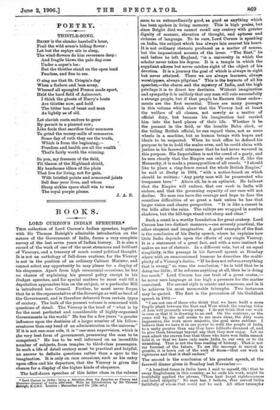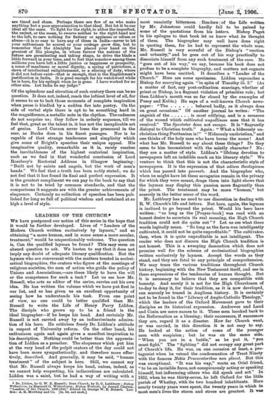BOOKS.
LORD CURZON'S INDIAN SPEECHES.*
THIS collection of Lord Curzon's Indian speeches, together with Sir Thomas Raleigh's admirable introduction on the nature of the Government of India, forms a very complete survey of the last seven years of Indian history. It is also a record of the work of one of the most strenuous and brilliant of Viceroys, and a treasury of much sound political thought. It is not an anthology of full-dress orations, for the Viceroy is not in the position of an ordinary Cabinet Minister, and cannot select any opportunity lie may please for a display of his eloquence. Apart from high ceremonial occasions, he has no chance of explaining his general policy except in his Budget speeches, and for special matters he must wait till a deputation approaches him on the subject, or a particular Bill is introduced into Council. Further, be must never forget that he is the representative of the Sovereign as well as bead of the Government, and is therefore debarred from certain types of oratory. The bulk of the present volume is concerned with questions of detail. The Viceroy is the head of " what is by far the most perfected and considerable of highly-organised Governments in the world." He has for a few years " a greater influence upon the destinies of a larger number of his fellow- creatures than any head of an administration in the universe." If it is not one-man rule, it is " one-man supervision, which is the very best form of government, presuming the man to be competent." He has to be well informed on an incredible number of subjects, from temples to third-class passengers. In such a life of detail oratory must be practical and helpful, an answer to definite questions rather than a spur to the imagination. It is only on rare occasions, such as his entry upon office and his departure, that the Viceroy is given the chance for a display of the higher kinds of eloquence.
The half-dozen speeches of this latter class in the volume
• Lord Curzon in India: being a Selection from his Speeches as Viceroy and Governor-General of India. 1898-19015. With an Introduction by Sir Thomas laloigh, K.C.S.L London : Macmillan and Co. [12s. net.] seem to us extraordinarily good, as gopd as anything which has been spoken in living memory. This is high praise, but
since Bright died we cannot recall any oratory with greater dignity of manner, elevation of thought, and aptness and richness of language. To be sure, Lord Curzon is speaking on India, the subject which has always lain nearest his heart.
It is not ordinary rhetoric produced as a matter of course, but the impassioned accents of the lover. " The East," he said before he left England, "is a university in which the scholar never takes his degree. It is a temple in which the suppliant adores but never catches sight of the object of his devotion. It is a journey the goal of which is always in sight but never attained. There we are always learners, always worshippers, always pilgrims." This is the keynote of all his speeches,—the charm and the mystery of India, and the high privilege it is to direct her destinies. Without imagination and sympathy it is unlikely that any man will rule successfully a strange people, but if that people be Eastern these endow- ments are the first essential. There are many passages in this volume which show that the Viceroy had at heart the welfare of all classes, not merely as a matter of official duty, but because his imagination had carried him into the hard places of their life. Whether it be the peasant in the field, or the humble Babu clerk, or the toiling British official, he can regard them, not as mere wheels in a machine, but as human beings with hopes and ideals to be respected. When he took office he defined his purpose to be to hold the scales even, and he could claim with justice in his farewell utterance that be bad never wavered in this purpose. His Imperialism is not the creed of a party, and he sees clearly that the Empire can only endure if, like the Monarchy, it is made a presupposition of all creeds. "I should like to place a ring-fence round the whole British Empire," he said at Derby in 1904, " with a notice-board on which should be written : 'Any party man will be prosecuted who trespasses here.' " Above all, he is an optimist. He believes that the Empire will endure, that our work in India will endure, and that the governing capacity of our race will not decline. No man can have the courage and hope to face the countless difficulties of so great a task unless he has . that larger vision and clearer perspective. " It is like a sunset in the hills after the rains. The valleys are wrapped in sombre shadows, but the hill-tops stand out sharp and clear."
Such a creed is a worthy foundation for great oratory. Lord Curzon has two distinct manners,—one severely practical, the other eloquent and imaginative. A good example of the first is the conclusion of his Derby speech, where he explains how little India depends upon the efforts of any single Viceroy. It is a statement of a great fact, and with a sure instinct he makes no use of rhetoric. In a different vein, but of an equal simplicity, is the passage in his farewell speech at Bombay where with an unaccustomed humour he describes the multi- plicity of a Viceroy's duties. " If he does not reform everything that is wrong," so runs the conclusion, " he is told that he is doing too little; if he reforms anything at all, then he is doing too much." Lord Curzon has one trait of a great orator,— he never uses language at too high a pressure for the matter contained. His second style is ornate and sonorous, and in it be achieves hie most memorable triumphs. Two instances may be quoted. The first is the peroration of his Guildhall speech in 1904 :—
"I am not one of those who think that we have built a mere fragile plank between the East and West which the roaring tidos of Asia will presently sweep away. I do not think that our work is over or that it is drawing to an end. On the contrary, as the years roll by, the call seems to me more clear, the duty more imperative, the work more majestic, the goal more sublime. I believe that we have it in our power to weld the people of India to a unity greater than any they have hitherto dreamed of, and to give them blessings beyond any that they now enjoy. Let no man admit the craven fear that those who have won India cannot hold it, or that we have only made India to our own or to its unmaking. That is not the true reading of history. That is not my forecast of the future. To me the message is carved in granite, it is hewn out of the rock of doom—that our work is righteous and that it shall endure."
The second is the conclusion of his greatest speech, at the farewell dinner given in Bombay last November:-
" A hundred times in India have I said to myself, Oh ! that to every Englishman in this country, as he ends his work, might be truthfully applied the phrase, 'Thou hast loved righteousness and hated iniquity.' No man has, I believe, • ever served India faithfully of whom that could not be said. All other triumphs are tinsel and sham. Perhaps there are few of us who make anything but a poor approximation to that ideal. But let it be our ideal all the same. To fight for the right, to abhor the imperfect, the unjust, or the mean, to swerve neither to the right hand nor to the left, to care nothing for flattery or applause or odium or abuse—it is so easy to have any of these in India—never to let your enthusiasm be soured or your courage grow dim, but to remember that the Almighty has placed your hand on the greatest of His ploughs, in whose furrow the nations of the future are germinating and taking shape, to drive the blade a little forward in your time, and to feel that somehow among these millions you have left a little justice or happiness or prosperity, a sense of manliness or moral dignity, a spring of patriotism, a dawn of intellectual enlightenment, or a stirring of duty, where it did not before exist—that is enough, that is the Englishman's justification in India. It is good enough for his watchword while he is here, for his epitaph when he is gone. I have worked for no other aim. Let India be my judge."
Of the splendour and elevation of such oratory there can be no question. It does not, indeed, reach the loftiest level of all, for it seems to us to lack those moments of complete inspiration when prose is kindled by a sudden fire into poetry. On the side of verbal style there is apt to be something hard in the magnificence, a metallic note in the rhythm. The cadences do not surprise us ; they follow in orderly sequence, till we
feel that, great as the talent is, it has not the inexplicable art of genius. Lord Curzon never loses the proconsul in the seer, as Burke does in his finest passages. Nor is he capable of that strange tenderness and simplicity which give some of Bright's speeches their unique appeal His imaginative quality, remarkable as it is, rarely reaches the inevitableness of the highest oratorical inspiration, such as we find in that wonderful conclusion of Lord Rosebery's Rectorial Address in Glasgow beginning : "Built not by saints and angels, but the work of men's hands." We feel that a truth has been nobly stated; we do not feel that it has found its final and perfect expression. It is the greatest compliment we can pay to the book to say that it is not to be tried by common standards, and that the comparisons it suggests are with the greater achievements of eloquence. Certainly no collection of speeches has been pub- lished for long so full of political wisdom and sustained at so high a level of style.







































 Previous page
Previous page